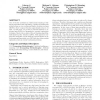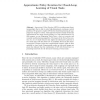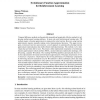81 search results - page 12 / 17 » Chess Neighborhoods, Function Combination, and Reinforcement... |
106
click to vote
ICAC
2006
IEEE
15 years 7 months ago
2006
IEEE
— Reinforcement Learning (RL) provides a promising new approach to systems performance management that differs radically from standard queuing-theoretic approaches making use of ...
115
click to vote
CORR
2002
Springer
15 years 1 months ago
2002
Springer
We present a generalization of conventional artificial neural networks that allows for a functional equivalence to multi-expert systems. The new model provides an architectural fr...
118
click to vote
ATAL
2009
Springer
15 years 8 months ago
2009
Springer
One of the key problems in reinforcement learning is balancing exploration and exploitation. Another is learning and acting in large or even continuous Markov decision processes (...
114
click to vote
ECML
2006
Springer
15 years 5 months ago
2006
Springer
Abstract. Approximate Policy Iteration (API) is a reinforcement learning paradigm that is able to solve high-dimensional, continuous control problems. We propose to exploit API for...
125
click to vote
CORR
2010
Springer
15 years 1 months ago
2010
Springer
Temporal difference methods are theoretically grounded and empirically effective methods for addressing reinforcement learning problems. In most real-world reinforcement learning ...



